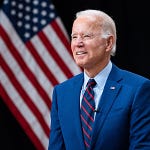President Biden announced the cancellation of student loans for 78,000 public service workers, including teachers, nurses, and firefighters, through the Public Service Loan Forgiveness program. This move addresses past administrative failures and brings the total number of public service workers who have received loan forgiveness under President Biden's administration to over 870,000, a significant increase from the 7,000 prior to his term. Additionally, nearly four million Americans have seen their student debt canceled under various relief actions by his administration.
The President also highlighted efforts to increase Pell Grants, improve Income-Driven Repayment plans, and introduce the SAVE plan to make higher education more accessible. Following the Supreme Court's decision against his original debt relief plan, President Biden emphasized his commitment to finding alternative ways to provide debt relief and to ensure higher education serves as a pathway to the middle class.
The White House released a fact sheet outlining criticism of a budget proposal by 80% of House Republicans, per the Republican Study Committee. President Biden criticized the Republican Study Committee's budget proposal as extreme. According to the fact sheet, this proposal aims to cut Medicare, Social Security, and the Affordable Care Act, potentially increasing costs for prescription drugs, energy, and housing while offering tax benefits to the wealthy. It suggests raising the Social Security retirement age.
The fact sheet contrasts this with President Biden's vision for an economy that supports the middle class, including opposing cuts to Medicare and Social Security and not raising the retirement age. The President's approach focuses on making the wealthy and corporations pay a fair share, strengthening healthcare through the Affordable Care Act, investing in America's future industries, and reducing costs for working families. The Republican plan is accused of risking healthcare for millions, favoring the wealthy and corporations at the expense of middle-class families, jeopardizing jobs, and making housing more expensive.
The UN General Assembly adopted a resolution, initiated by the U.S. and supported by over 120 countries, to establish guidelines for Artificial Intelligence deployment and usage to ensure AI systems are safe, secure, and trustworthy. This resolution outlines a vision for addressing AI's potential and challenges, emphasizing international collaboration, equitable access, risk management, privacy protection, misuse prevention, bias and discrimination reduction, and sustainable development support. It stresses the importance of human rights and freedoms in AI development. This move reflects President Biden's commitment to reasserting U.S. leadership globally and engaging in comprehensive discussions on managing AI's impact. After extensive negotiations, this resolution sets foundational principles for future AI development and usage, highlighting the ongoing need for international cooperation as AI technology rapidly progresses.
Vice President Harris expressed support for the UN General Assembly's resolution on AI, emphasizing the United States' commitment to global cooperation on emerging technologies. She highlighted the importance of AI benefiting the public, addressing risks, and ensuring equitable access and protection of rights.
President Biden has announced the nominations of Michael Sulmeyer as Assistant Secretary of Defense for Cyber Policy and Christopher T. Hanson as Member and Chair of the Nuclear Regulatory Commission. Sulmeyer, currently the Principal Cyber Advisor to the Secretary of the Army, has a background in cyber matters, strategy, and policy, with experience in the Department of Defense, National Security Council, U.S. Cyber Command, and academia. Hanson, who has been serving as a Commissioner of the NRC since 2020 and was designated Chair by President Biden in 2021, brings over two decades of experience in nuclear energy from both government and private sectors, including roles in the Senate Appropriations Committee, Department of Energy, and consulting at Booz Allen Hamilton. Hanson holds master's degrees from Yale Divinity School and Yale School of Forestry and Environmental Studies and a Bachelor of Arts from Valparaiso University.
This week, the White House Office of Public Engagement hosted a roundtable focusing on Black men's mental health, moderated by Charisse Jones and featuring notable figures such as Courtney B. Vance, Raheem DeVaughn, Lamman Rucker, Dr. Robin L. Smith, and Dr. Walker Tisdale. The discussion centered on President Biden's initiatives to combat the mental health crisis in the U.S., emphasizing health equity in communities of color. Since taking office, President Biden has introduced a comprehensive mental health strategy to increase system capacity, improve access to care, and foster healthier environments. Efforts include launching the 988 hotline, expanding community mental health centers, and establishing Centers of Excellence for promoting mental health with culturally competent care. The administration aims to continue its investment in mental health and substance use support as part of the proposed budget for Fiscal Year 2025.












